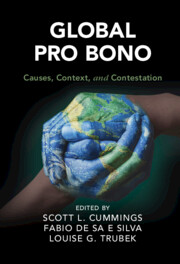Book contents
- Global Pro Bono
- Cambridge Studies in Law and Society
- Global Pro Bono
- Copyright page
- Contents
- Contributors
- Chapter One What Is Global about Pro Bono and What Is Global Pro Bono About?
- Part One The Americas
- Part Two Europe
- Part Three OCEANIA
- Part Four Africa
- Part Five Asia
- Chapter Fifteen The Evolving Contours of Private Pro Bono Policy and Practice in India: Local and Global Contexts
- Chapter Sixteen “Pro Bono” in Singapore: Importing, Adopting, Transforming
- Chapter Seventeen The Rise of Private Public Interest Lawyers in China
- Index
- Cambridge Studies in Law and Society
Chapter Seventeen - The Rise of Private Public Interest Lawyers in China
from Part Five - Asia
Published online by Cambridge University Press: 06 May 2022
- Global Pro Bono
- Cambridge Studies in Law and Society
- Global Pro Bono
- Copyright page
- Contents
- Contributors
- Chapter One What Is Global about Pro Bono and What Is Global Pro Bono About?
- Part One The Americas
- Part Two Europe
- Part Three OCEANIA
- Part Four Africa
- Part Five Asia
- Chapter Fifteen The Evolving Contours of Private Pro Bono Policy and Practice in India: Local and Global Contexts
- Chapter Sixteen “Pro Bono” in Singapore: Importing, Adopting, Transforming
- Chapter Seventeen The Rise of Private Public Interest Lawyers in China
- Index
- Cambridge Studies in Law and Society
Summary
Although it is hard to give a unified and standardized definition to pro bono, this practice has become increasingly institutionalized worldwide. Driven by transitional legal practice, the global market for legal services, and international rule of law campaigns, pro bono work has taken place not only in developed countries (e.g., the United States, Ireland, Canada, and Austria) but also in developing countries and so-called emerging economies, such as China, India, and Brazil. The International Bar Association (IBA) has done a great deal of work to facilitate pro bono practice throughout the world. An unprecedented international pro bono initiative by the DLA Piper law firm has yielded pro bono lawyers who donated over two hundred thousand hours in 2017. Law schools also participate in this social movement. Law students who take international public interest courses in the United States apply their knowledge in a global setting. Graduates of American law schools have even begun to practice public interest law in other counties. Therefore, pro bono has become a globalized social movement accompanying legal globalization.
- Type
- Chapter
- Information
- Global Pro BonoCauses, Context, and Contestation, pp. 672 - 704Publisher: Cambridge University PressPrint publication year: 2022



